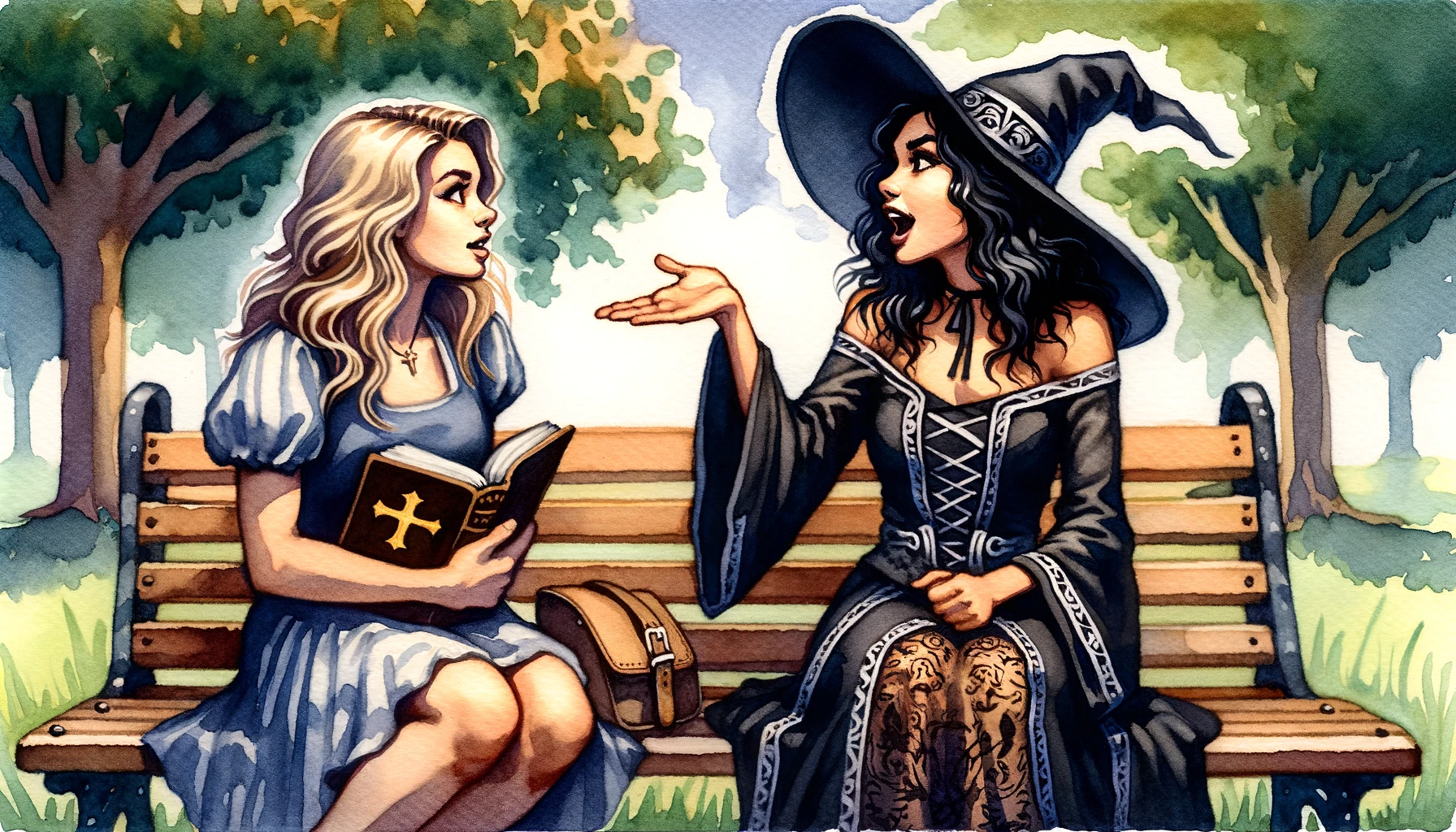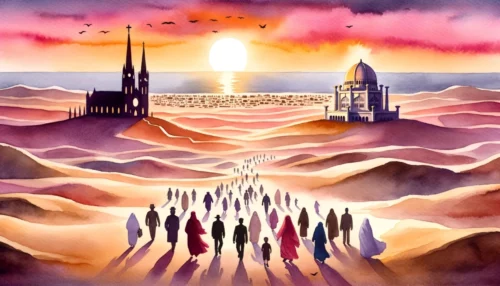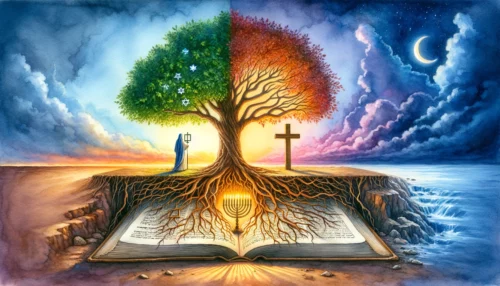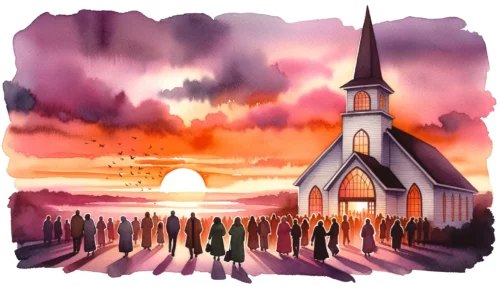The popularity of Wicca has grown significantly over the past few decades, leading many people – Christians included – to ask questions about its practices, beliefs, and compatibility with the teachings of the Bible. Our goal is not to condemn, but to discern, with a spirit of love, understanding, and respect. In this pursuit, we’ll study the origins, beliefs, and practices of Wicca, contrast them with Christian teachings, and discuss why these differences matter.
The Origins and Beliefs of Wicca
Gerald Gardner, often regarded as the father of Wicca, introduced it to the public in the mid-20th century. Though Wicca is relatively modern, it borrows heavily from ancient pagan and hermetic traditions, creating a rich and diverse belief system that varies among practitioners. For Wiccans, there is no single holy book, dogma, or organized hierarchy. Rather, Wicca emphasizes personal experience and self-discovery.
Central to Wicca is the reverence for nature. Wiccans perceive the divine in the natural world and honor it through seasonal celebrations known as sabbats, which align with the phases of the moon and the changing of the seasons. The divine is often conceived as a Goddess and a God, embodying the life-giving and nurturing aspects of nature. Wicca does not advocate for the concept of sin, particularly original sin, which contrasts with Christian teaching (Romans 5:12).
Wiccans perform rituals and cast spells as part of their religious practice. Spells are not considered malevolent or demonic, but are seen as a way to harness natural energy to effect change, akin to prayer in Christianity. Another cornerstone of Wiccan belief is the rule of threefold return, which suggests that whatever energy a person puts out into the world, be it positive or negative, will return to them threefold.
A key practice of Wicca is witchcraft, which is viewed as a skill that enables individuals to tune in with natural forces. Wiccans differentiate between black and white magic – black magic being actions that harm others and violate their free will, which is discouraged, and white magic, used for positive change and healing, which is encouraged. This belief in magic and witchcraft markedly differs from Christianity, which perceives these practices as contrary to the commandments of God (Deuteronomy 18:10-12).
Wiccans believe in reincarnation, a cyclic journey of the soul, which is another significant deviation from Christian beliefs of eternal life (John 3:16). There is a marked absence of the concept of a punishing Hell or rewarding Heaven in Wiccan philosophy, again contrasting sharply with Christian views of afterlife (Revelation 21:1-4).
Wicca is a diverse, nature-centered spiritual path drawing from ancient pagan and hermetic traditions. It includes the reverence of a Goddess and a God, celebrates nature through sabbats, and supports the practice of witchcraft to harness natural energies. The Wiccan rule of threefold return mirrors the concept of karma, and they believe in reincarnation rather than eternal life. This belief system and its practices reveal stark contrasts with Christian teachings on the nature of God, sin, the use of magic, and the afterlife.
Wicca vs Christian Teachings
Digging deeper into the belief systems, the differences between Christianity and Wicca become more apparent. Christianity is monotheistic, professing belief in one God who is the creator of all things (Genesis 1:1). This contrasts with Wicca’s duotheistic system, where a Goddess and a God are worshipped. While God in Christianity is viewed as transcendent and personal, the Wiccan divinity is immanent, manifesting in nature and within the self.
In Christianity, the Bible is the authoritative source of divine revelation and moral guidance (2 Timothy 3:16). The absence of a comparable sacred text in Wicca allows for an individualistic approach to spirituality that may change and evolve over time. This flexibility contrasts with the constancy of biblical teachings.
Christianity presents a moral framework grounded in the teachings of Jesus Christ and the commandments found in the Bible (Matthew 22:37-39). Sin is a reality with real spiritual consequences (Romans 6:23). In Wicca, the concept of sin does not exist. Instead, moral guidance comes from the Wiccan Rede, advising practitioners to do no harm.
Christians believe in the power of prayer to a personal and loving God (Philippians 4:6). This differs from Wiccan practices of casting spells and conducting rituals to manipulate natural energies. Wicca encourages the practice of witchcraft; in contrast, Christianity discourages any form of sorcery (Galatians 5:19-21).
Christianity posits that each person has one life to live on Earth, followed by eternal life or eternal separation from God based on acceptance or rejection of Christ (Hebrews 9:27). Wicca’s belief in reincarnation stands at odds with this fundamental Christian belief.
The role of Jesus Christ is another key distinction. In Christianity, Jesus is the Savior, the only way to eternal life (John 14:6). Wicca does not share this view, lacking any comparable figure for salvation.
Christianity and Wicca present different views on God, divine revelation, morality, prayer, afterlife, and salvation. Christianity’s monotheistic belief contrasts with Wicca’s duotheism. The Bible’s constancy stands in contrast to the flexible, personal spirituality of Wicca. Christian morality rooted in biblical commandments differs from Wiccan ethics guided by the Rede. Prayer to a personal God in Christianity diverges from Wiccan spell-casting. Views on afterlife differ, with Christianity teaching eternal life and Wicca promoting reincarnation. The Christian belief in Jesus as the only Savior is absent in Wicca.
The Implications of These Differences for Christians
Bringing these differences to light is not for the purpose of inciting division, but for nurturing a well-rounded understanding of our Christian faith and encouraging discernment. As Christians, we believe in one God, and the Bible tells us that we should have no other gods (Exodus 20:3). By embracing Wiccan beliefs, Christians would be acknowledging and revering multiple deities, which is incompatible with our faith.
The Christian doctrine of sin and salvation provides a framework for moral guidance and hope for eternal life through Christ’s sacrifice (1 John 1:9, Romans 5:8). Wicca’s lack of a defined sin and a Savior dismisses the need for a Savior and undermines Christ’s unique role in Christianity.
Prayer in Christianity is a way to communicate with a personal God, to praise Him, seek His guidance, express repentance, and request help (1 Thessalonians 5:16-18). Wicca’s practices of casting spells to manipulate natural energies are not compatible with this Christian concept of prayer and could lead one away from a reliance on God’s providence.
The Bible offers Christians a comprehensive moral and spiritual guidance system that is believed to be divinely inspired and unchanging (Psalm 119:89). Wicca’s lack of a universally recognized holy text may lead to subjective interpretations of morality, which can be inconsistent with Christian moral teachings.
Christianity emphasizes the sanctity of life and the promise of eternal life through faith in Jesus Christ (John 11:25-26). The concept of reincarnation in Wicca, which suggests an ongoing cycle of life, death, and rebirth, contradicts the Christian belief in a single earthly life followed by an eternal afterlife.
The differences between Wicca and Christianity are not trivial, but have deep implications for our faith. Embracing Wiccan beliefs would contradict the monotheism central to Christianity, and undermine the doctrine of sin and salvation. Wiccan spell-casting practices do not align with the Christian concept of prayer, and the lack of a universally recognized holy text in Wicca can lead to subjective interpretations of morality. Wicca’s belief in reincarnation is inconsistent with the Christian belief in eternal life through faith in Christ. These contrasts underscore the importance of discernment and understanding of our Christian faith.
Standing Firm in Faith
In recognizing the contrasts between Wicca and Christianity, we affirm the foundations of our faith. We’ve looked at how our belief in one God, our understanding of sin and salvation, the value we place on prayer, the guidance we find in the Bible, and our hope for eternal life distinctly set Christianity apart. These differences illuminate the unique truths of our faith and call us to remain rooted in our convictions.
- How can understanding these contrasts strengthen your commitment to Christian beliefs?
- In what ways can these insights deepen your appreciation for the distinctiveness of our faith?
- How can this knowledge empower you to converse about your faith with greater clarity and confidence?
Let us draw strength from the uniqueness of our faith. May we find joy in standing firm, unwavering in our conviction, and steadfast in our Christian beliefs, always ready to give a reason for the hope that we have. (1 Peter 3:15)














